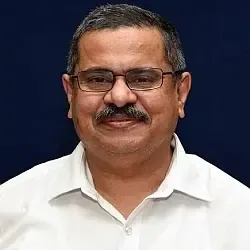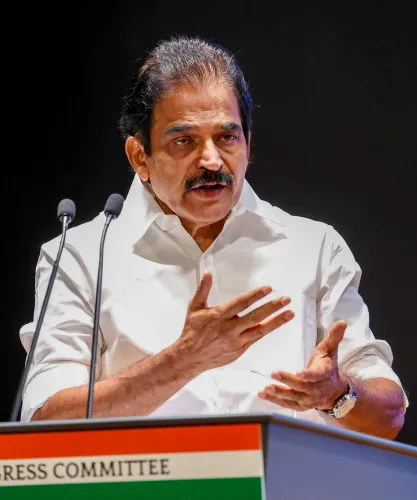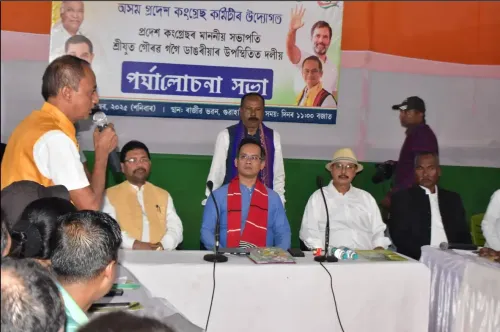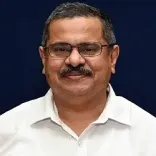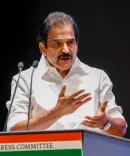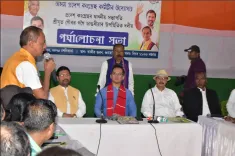What Is the Focus of India-US Relations at the Inaugural Seminar of the Motwani Jadeja Institute for American Studies?
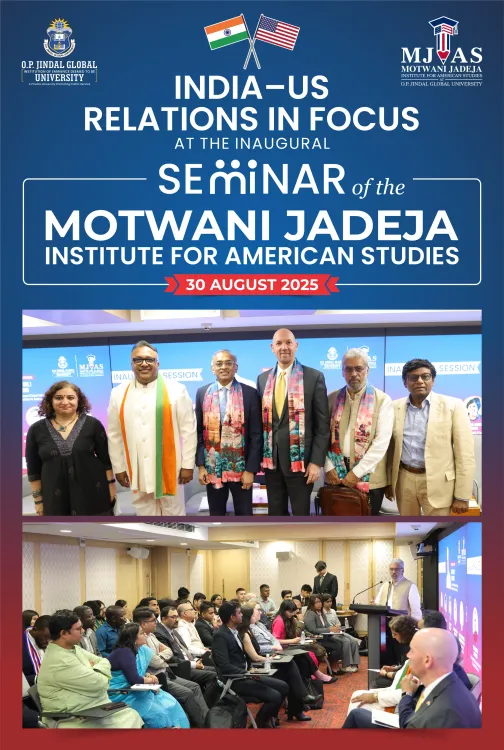
Synopsis
Key Takeaways
- Strategic patience is essential for India in its dealings with the US.
- Understanding historical complexities is crucial for navigating current challenges.
- The relationship between India and the US requires ongoing dialogue and diplomacy.
- Challenges in trade and regulation remain significant factors affecting bilateral ties.
- The establishment of MJIAS marks a commitment to enhancing Indo-US policy discourse.
New Delhi, Sep 1 (NationPress) “Today, we require a sense of strategic patience. India must stand firm and not succumb to demands, while remaining open to negotiations. Understanding the sources of change within the United States is crucial,” stated the esteemed author, thinker, and foreign policy expert Professor (Dr) C. Raja Mohan during the inaugural seminar of the Motwani Jadeja Institute for American Studies (MJIAS).
The seminar was titled “Resetting the US-India Ties Through Dialogue & Diplomacy.”
Hosted in New Delhi, this event served as a platform for substantial discussions and strategic engagement, celebrating the establishment of MJIAS as a respected, non-partisan venue for Indo-US policy dialogue.
Professor (Dr) C. Raja Mohan is also recognized as the Distinguished Professor & Senior Fellow Designate at MJIAS. The United States and India, both among the world’s largest democracies, share a relationship characterized by strategic depth and diverse engagement. Their cooperation encompasses defence, technology, education, and personal ties, although challenges in trade and regulation persist, impacting this essential partnership.
In his thorough analysis, Dr C. Raja Mohan expressed, “Considering the challenging times faced by both India and the US, having an institute like the Motwani Jadeja Institute of American Studies is vital. Its long-term contributions will help elevate this relationship and provide intellectual support. It’s evident that India has not invested sufficiently in understanding the intricate politics of the US. To grasp the current situation in the US, we must delve deeper into its history and culture.”
In a comprehensive dialogue that examined various phases of the India-US relationship, Dr Mohan noted, “In the 1960s, India experienced technological collaborations with the US. It’s often overlooked that the first Indian reactor, satellite, agrarian revolution, and Green Revolution were supported by American initiatives. However, in 1971, a series of events led to a significant downturn in this relationship. Many of these challenges were navigated in the 2000-2005 timeframe with four successive Prime Ministers -- P.V. Narasimha Rao, Atal Bihari Vajpayee, Dr Manmohan Singh, and Narendra Modi -- who dedicated considerable political and diplomatic efforts to revitalize this relationship.”
As its inaugural event, MJIAS convened parliamentarians, diplomats, business leaders, and academics to discuss enhancing Indo-US relations through dialogue and diplomacy.
Professor (Dr) C. Raj Kumar, President of MJIAS and Founding Vice Chancellor of JGU, remarked in his Welcome Address: “We are hosting this seminar at a crucial time given the significant challenges in US-India relations. It’s essential to look beyond the current state. For many who have had the privilege to engage with the US, it’s notable that no other nation shares as close a bond with India in terms of shared beliefs, values, and a collective commitment to the rule of law and democratic institutions. The India-US relationship is not only one of the most defining of the future but also an opportunity to shape the future of humanity. The US has been the birthplace of numerous ideas, and we must acknowledge the extraordinary shared history of our nations. The establishment of the Motwani Jadeja Institute of American Studies aims to foster deeper understanding of India in the US and the complexities of our relationship for a brighter future.
The Special and Keynote Addresses were presented by Ambassador Nagaraj Naidu Kakanur, Additional Secretary, Ministry of External Affairs, Government of India, and His Excellency Jorgan K. Andrews, Charge d’Affaires, Senior Foreign Service Officer, U.S. Department of State, respectively.
Both expressed their congratulations to JGU for founding the Motwani Jadeja Institute for American Studies, thanked Asha Jadeja Motwani for her generous donation, and highlighted the significant role it could play in advancing India-US relations.
They praised O.P. Jindal Global University for its vision in creating a pioneering institution devoted to American Studies in India, emphasizing that such initiatives enrich academic discourse and strengthen bilateral understanding.
Ambassador Naidu and Andrews also pointed out that the establishment of the Motwani Jadeja Institute exemplifies the strength of philanthropy, commending Asha Jadeja Motwani for her exceptional contribution that will create a lasting legacy.
They observed that few universities in the region have demonstrated the foresight and commitment that JGU has shown in investing in intellectual resources to enhance India-US relations.
The presence of the Institute not only elevates JGU's global standing but also serves as a model for how private philanthropy and academic excellence can come together to tackle pressing international challenges.
Professor (Dr) Mohan Kumar, the Inaugural Director General of MJIAS, stated in his Introductory Remarks that there couldn’t be a more opportune time for discussions on the India-US relationship by the Motwani Jadeja Institute of American Studies.
“This is not the first instance of the India-US relationship facing difficulties. Such dialogue is essential to maintain the relationship, which cannot be viewed through the lens of a few months or just trade and tariffs.”
The Vote of Thanks was delivered by Professor (Dr) Swati Chawla, Assistant Director, MJIAS.
The inaugural session included several panel discussions:
Legislative Bridges & Policy Dialogue in India-US Relations, moderated by Professor (Dr) Sreeram S. Chaulia, Dean, Jindal School of International Affairs, JGU
Commerce Without Conflict -- Perspectives from Business, Trade & Investment Leaders, moderated by Professor Ram B. Ramachandran, Associate Director, MJIAS & Vice Dean, Jindal School of Banking & Finance, JGU
Strategic Symbiosis -- Academic and Diplomatic Pathways to Bilateral Harmony, moderated by Professor (Dr) Sriparna Pathak, Associate Director, MJIAS & Professor, Jindal School of International Affairs, JGU.
Notable participants included: Dr Sasmit Patra, Member of Parliament, Rajya Sabha; Ambassador Meera Shankar, Former Indian Ambassador to the United States; Sharmila Kantha, Principal Consultant, Confederation of Indian Industry; Shishir Priyadarshi, President, Chintan Research Foundation; Ambassador Sanjay Kumar Verma, Chairperson, Research and Information System for Developing Countries; Raman Kalra, Vice President, IBM Consulting; Ambassador Mr. Arun Kumar Singh, Former Indian Ambassador to the United States; Ambassador Mr. Rajiv Bhatia, Distinguished Fellow, Gateway House; Ambassador Gaitri Issar Kumar, Former Indian Diplomat; and Professor (Dr) Rajat Kathuria, Dean, School of Humanities and Social Sciences, Shiv Nadar University.
The seminar addressed two pivotal questions facing India-US ties today: How did we reach this point? and Where do we proceed from here? The consensus indicated that various factors, including trade and tariffs, Indian procurement of Russian oil, US-Pakistan relations, President Trump’s personal grievances towards India, and the changing dynamics of US-China relations, have contributed to the current impasse in bilateral ties.
In response, it was suggested that India must consolidate its position, exhibit strategic resilience, diversify its export markets, and maintain its stance.
It was broadly acknowledged that the US remains a vital strategic ally and that, despite current challenges, the partnership between India and the US has the potential to be the most significant of the twenty-first century.
O.P. Jindal Global University (JGU) proudly announced a substantial endowment of US$5 million from Asha Jadeja Motwani and the Motwani Jadeja Family Foundation.
This groundbreaking donation is among the most significant philanthropic contributions to JGU and one of the largest investments in American Studies in India.
The Institute is named in memory of the late Professor Rajeev Motwani, a distinguished computer scientist from Stanford University, whose mentorship played a pivotal role in shaping the careers of the founders of Google and numerous other innovators.


